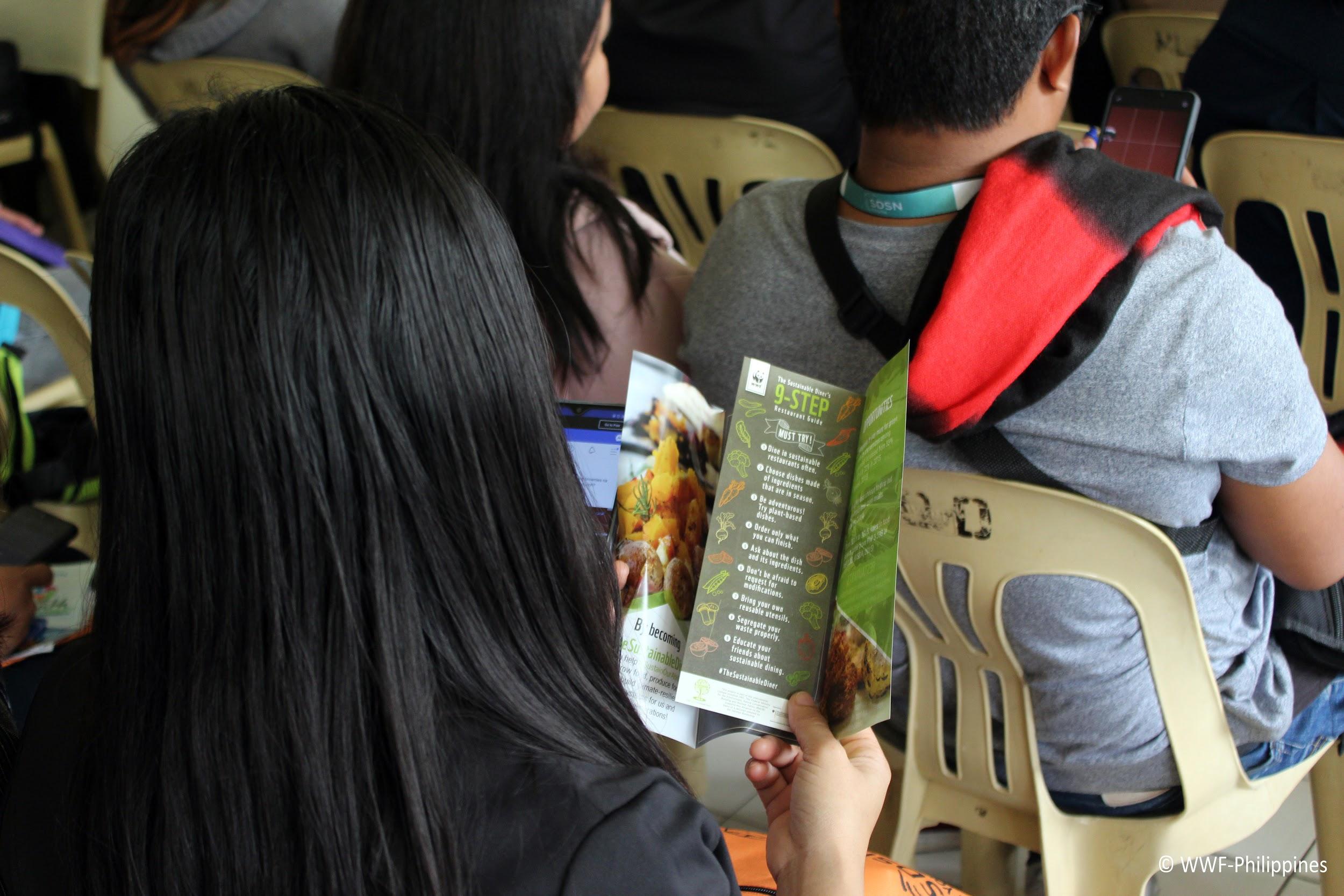The Sustainable Diner at the UN SDSN Youth Sustainability Convergence 2019
August 2019

Melody Melo-Rijk, WWF’s Project Manager for Sustainable Consumption and Production in the Philippines, posing with the participants who attended her breakout session on sustainable dining.
Last August 16, 2019, the World Wide Fund for Nature (WWF) Philippines’ The Sustainable Diner: A Key Ingredient for Sustainable Tourism project participated through a speaking engagement at the Environment breakout session on the second day of the UN SDSN Youth Sustainability Convergence 2019. With the theme “Shaping Solution Leaders for a Sustainable 2030,” the event gathered youth organizations and sustainable development goals (SDG) advocates to strengthen the on-going initiatives of the youth sector and expand young people’s programs and strategies in achieving the SDGs. The UN Sustainable Development Solutions Network (SDSN) Youth - Philippines hosted the four-day event at the Baguio Teachers’ Camp in Baguio City, which saw the participation of almost a thousand youth representatives as well as more than thirty organizations and companies who showcased their work and how these contribute to the achievement of the SDGs. In 2015, SDSN launched SDSN Youth as its official youth initiative. SDSN youth educates young people about the challenges of sustainable development and creates opportunities for them to use their creativity and knowledge to pioneer innovative solutions for the SDGs.

Melo-Rijk emphasizing the need for our consumption patterns to change, starting with eating less meat and more fruits and vegetables.
Melody Melo-Rijk, WWF’s Project Manager for Sustainable Consumption and Production in the Philippines, introduced The Sustainable Diner project to the youth participants. Focusing on the food service industry, the project focuses on SDG 12: Responsible Consumption and Production. She emphasized that their mindsets and choices as consumers can make all the difference in helping steer the local food service industry towards more sustainable operations. “People don’t often realize how greatly food affects the environment. Food production, in particular, accounts for 24-30% of global greenhouse emissions. Because forest areas are continuously being converted into agricultural land in order to accommodate the needs of growing populations, food production has also contributed to a 70% loss of biodiversity,” says Melo-Rijk. “What this tells us is that what we eat, where we eat, and how we eat all contribute to the climate crisis we are experiencing today. Because food is a basic necessity, now more than ever, it is important for us to look at our production and consumption patterns and see how we can make the involved industries more sustainable.”

The host of the Environment breakout session sharing his thoughts on sustainable dining and opening the floor for questions from the other participants.
The program participants, youth leaders aged 15-35, make up the bulk of the Millennial customer base - a group that companies and marketing firms consider as the next generation of active consumers across different industries. It is because of this reason that the choices made by this consumer base becomes increasingly important in the grander scheme of global retail, a huge chunk of which is comprised of food service establishments. The good news is that according to a study conducted by Nielsen in 2015, 72% of Millennials are now willing to pay more for green products and services. “Governments, companies, and organizations are all looking at the youth as the next generation driver of economies globally. The way you shape and influence public perception and mindsets, especially when it comes to dining, will be vital in promoting responsible consumption and production,” says Melo-Rijk. “We need your help in spreading our advocacy through your actions and choices, because when multiplied, these can speak louder than the words we are sharing with you right now. Avoid over-ordering, take home your leftovers, say no to single-use plastics, and lessen your meat consumption. These are simple ways in which you can help spread the concept of sustainable dining."

One of the youth participants reviewing The Sustainable Diner project’s 9-Step Restaurant Guide, which lists nine ways on how consumers can practice sustainable dining in their daily lives.
The break-out session ended with a 15-minute open forum, where participants were invited to ask their questions on sustainable dining, sustainability, and WWF-Philippines’ projects and efforts all over the country. A short Q&A game was also conducted to test how much the participants listened to the presentation.
The Sustainable Diner project believes that as the generation who will inherit the planet, the youth has the power and potential to change the course of climate change and to influence economies, industries, and policies towards sustainable development. When mobilized, empowered, and energized, the youth are more than capable of implementing projects which will benefit not only their direct communities but also the greater environment. We thank the UN SDSN Youth - Philippines for inviting us to share our advocacy on sustainable dining and how supporting it can help push the SDGs, especially SDG 12, forward.
The Sustainable Diner project, under WWF-Philippines’ Sustainable Consumption and Production, is part of the International Climate Initiative (IKI). The Federal Ministry for the Environment, Nature Conservation, and Nuclear Safety (BMU) supports this initiative on the basis of a decision adopted by the German Bundestag.
For more information, please contact:
Melody Melo-Rijk
Project Manager
mmelorijk@wwf.org.ph
For media arrangements, please contact:
Pamela Luber
Integrated Marketing Communications Specialist
pluber@wwf.org.ph
Lorayne Roque
Sustainable Consumer Specialist
lroque@wwf.org.ph
